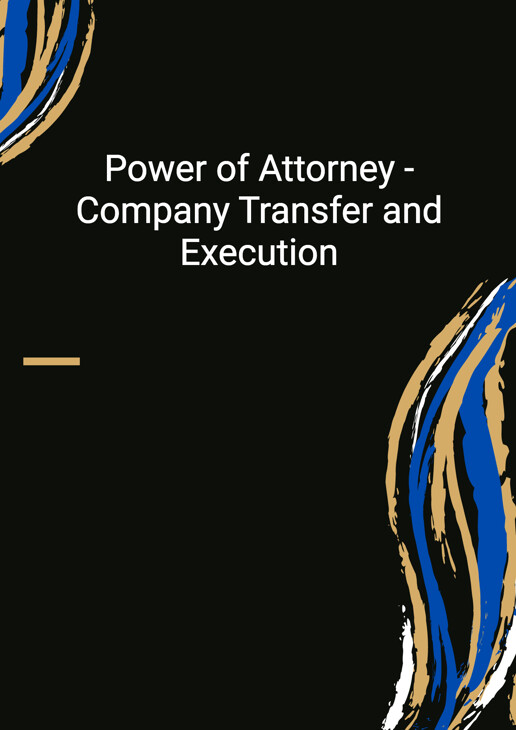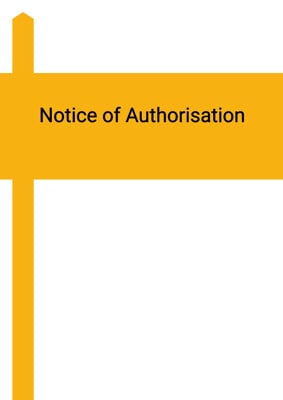
Power of Attorney - Company Transfer and Execution
Default by Shareholder / JV Partner
This POA is suitable in case a shareholder defaults of its obligations under the shareholders / joint venture agreement. The Deed appoints the Company as its attorney for all transfer and acts under the Agreement.
How to Tailor the Document for Your Need?
01
Create Document
Fill in the details of the parties. You can click the "Fill with Member’s Information" button to complete it with information saved to your account.
02
Fill Information
Please fill in any additional information by following the step-by-step guide on the left hand side of the preview document and click the "Next" button.
03
Get Document
When you are done, click the "Get Document" button and you can download the document in Word or PDF format.
04
Review Document
The document should be signed by the authorised signatory (or directors of a company) and witnessed to complete the formality.
Document Preview
Document Description
The document titled 'Power of Attorney - Company Transfer and Execution' is a legal instrument that grants the company the authority to act on behalf of the principal in executing transfers and other actions related to the agreement. It is made with the intention of securing the performance of the principal's obligations under the agreement. The document consists of several sections.
Section 1: Introduction
The document begins with an introduction that states the purpose and background of the power of attorney. It explains that the principal has entered into an agreement with the company regarding the company's account and job. As part of the agreement, the principal is required to provide a power of attorney in the form of this deed.
Section 2: Appointment of the Company as Attorney
This section outlines the appointment of the company as the attorney of the principal. The appointment is irrevocable and unconditional, and it serves as security for the principal's obligations under the agreement. The company is authorized to execute transfers, documents, and other actions on behalf of the principal as it deems necessary or desirable.
Section 3: Duration of the Appointment
This section specifies that the appointment of the company as attorney will remain in force until the principal ceases to be a shareholder, as defined in the agreement. After that date, the appointment will have no further effect.
Section 4: Compliance with Constitutional Documents
This section states that the execution of this deed is permitted by and in accordance with the provisions of the principal's constitutional documents.
Section 5: General Provisions
This section includes general provisions regarding the interpretation of terms used in the deed. It clarifies that 'person' includes corporations and unincorporated bodies, and that singular and masculine terms include their plural and feminine/neuter counterparts. It also specifies that the deed is governed by the laws of the jurisdiction country.
Section 6: Execution of the Deed
The document concludes with a section for the principal to execute and deliver the deed. It includes spaces for the principal's signature, as well as the signature, name, title/occupation, and address of a witness.
This power of attorney is of significant importance as it grants the company the authority to act on behalf of the principal in executing transfers and other actions related to the agreement. It ensures that the principal's obligations under the agreement are fulfilled and provides a legal framework for the company to carry out necessary actions.
How to use this document?
1. Review the agreement: Familiarize yourself with the contents of the agreement that necessitates the execution of this power of attorney.
2. Understand the purpose: Recognize that this power of attorney is intended to grant the company the authority to act on behalf of the principal in executing transfers and other actions related to the agreement.
3. Appoint the company as attorney: Acknowledge that the principal appoints the company as its attorney, giving it the power to execute transfers and other necessary actions as it deems fit.
4. Ensure irrevocability and security: Understand that the appointment of the company as attorney is irrevocable and serves as security for the principal's obligations under the agreement.
5. Determine duration of appointment: Note that the appointment remains in force until the principal ceases to be a shareholder, as defined in the agreement.
6. Comply with constitutional documents: Ensure that the execution of this deed is in accordance with the provisions of the principal's constitutional documents.
7. Understand general provisions: Familiarize yourself with the general provisions of the deed, including the interpretation of terms and the governing laws.
8. Execute the deed: Sign the deed as the principal, and have a witness sign and provide their name, title/occupation, and address.
By following these steps, you can effectively use this power of attorney to authorize the company to act on your behalf in executing transfers and other necessary actions as required by the agreement.
Not the right document?
Don’t worry, we have thousands of documents for you to choose from:























